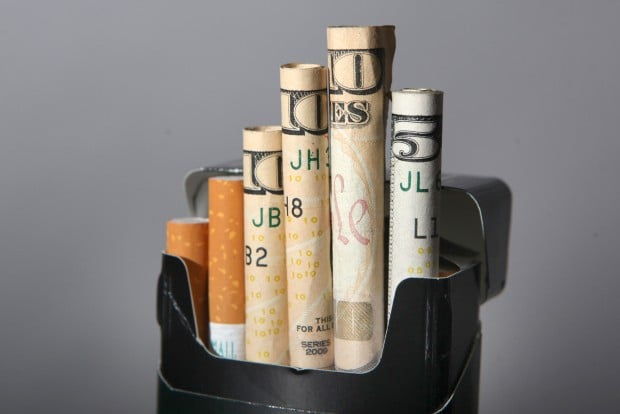Quit Smoking and Save Money
It’s easy to figure out that quitting smoking not only improves your health but also has a significant impact on your finances. By kicking the habit, you can save considerable money that would have otherwise been spent on cigarettes. After all, it costs you a fold – every dollar you have spent on a packet should have been an extra money in your pocket instead. Think about it. How much does smoking cost? If there is one financial thing you could do to start seeing an immediate return, it would be to stop smoking. You have to grasp the idea that to quit smoking entirely is to save money. The average cost of a pack of cigarettes is $8 in America. So, if you smoke a pack a day and quit, you could save $56 a week or $2912 a year. Rather than wasting your money, you could have saved thousands of dollars.
Indisputably, knowing how to save money is important and learning new techniques to save more money is fantastic. You can save money by running batch errands. Or, you could also buy durable goods. Being able to buy =durable quality products= will save you a lot of money. These goods are designed to last long, providing extended use and value for your investment. And while it may have a higher upfront cost compared to cheaper versions, they often save money in the long run by reducing the need for frequent replacements or repairs. Thus, you can save a lot of money buying quality in the long run. That is why learning to recognize quality products is a wise thing to do if you wish to save money.
This article will explore how quitting smoking is a positive step for your well-being and a smart financial decision.
Quit smoking and save money
Quitting smoking is not just a step towards better health. It’s also a significant financial decision that can lead to substantial savings and purchasing benefits. Here’s how kicking the habit can positively impact your finances: the most direct financial benefit of quitting smoking is removing the cost of cigarettes from your budget. With the average price of a pack of cigarettes varying across states but often being quite high, the amount of money saved can add up quickly. Take note: A pack each day, quitting smoking can save you about $2912 annually. That is a lot of money; what could you do with an extra $2912 a year? Quitting smoking can significantly increase your financial resources, allowing you to allocate more funds towards meaningful purchases.
Reduced Health Care Costs
If the price of the cigarettes does not terrify you enough, think about all the possible health costs involved if you smoke. Smokers generally face higher healthcare costs than non-smokers, including more frequent visits to healthcare providers. This only means you have higher premiums for health insurance and increased spending on medications for smoking-related health issues.
Indeed, over time, quitting smoking can result in significant savings on medical expenses. Heart disease, lung cancer, and respiratory conditions are just a few of the health concerns that smoking is associated with, and all of them call for medical attention. People who give up smoking have a lesser chance of acquiring these illnesses, which eventually lowers the need for medical care and associated expenses. Furthermore, the general health of ex-smokers is usually better, resulting in fewer hospital stays, prescription drug use, and doctor visits. To sum it all up, quitting smoking can lead to a healthier life with fewer medical expenses.
Lower Insurance Premiums
Life insurance premiums can be significantly higher for smokers due to the increased risk of health issues. Smoking is associated with various health risks, which increases the likelihood of insurance claims. Therefore, insurance companies often charge higher premiums to smokers to offset the higher potential costs associated with their increased health risks. By quitting smoking, you can qualify for lower insurance rates since insurance companies often offer lower premiums to non-smokers as an incentive for healthier lifestyle choices. This reduction can also extend to health and disability insurance.
Increased Home Resale Value
Quitting smoking can increase home resale value for several reasons. Foremost, smoking inside a house decreases its value due to lingering odors and stains. Puffing a cigarette indoors leaves a persistent smell that can be off-putting to potential buyers. You can eliminate this odor by quitting smoking and thoroughly cleaning the home, making the house more appealing to a broader range of buyers. It may also be necessary to repaint or replace stained walls, ceilings, and furniture due to indoor smoking. Additionally, since there is an increasing focus on wellness and health, non-smoking homes might be more in line with current market trends, which would increase their resale value.
Overall, quitting smoking can help maintain your home’s value, making it more appealing to potential buyers and possibly fetching a higher sale price.
Career Benefits
Smoking can be of so much distraction, especially during working hours. How often do you leave your desk to take a cigarette break on a day-to-day basis? Perhaps a lot. The time you spent smoking could have been used to be productive at work. This implies that quitting smoking can lead to better productivity, which could positively influence your career advancement opportunities and potential for salary increases.
Long-term Financial Growth
The long-term financial benefits of quitting smoking can be substantial. Take the money you would have saved by not buying cigarettes, for example, as this can add up over time. Putting the money you save from not purchasing cigarettes into an investment has the potential to grow in a split second. In addition, you can benefit from compound gains by regularly allocating those savings to investments in stocks, bonds, mutual funds, or retirement accounts. This can help you attain your financial objectives faster. It’s wise to redirect the money that would have gone toward supporting a bad habit for something that would improve your financial security.
Reducing medical expenses linked to smoking-related ailments can also result in savings on healthcare costs when a smoker quits. Even modest savings can accumulate substantially when consistently invested in retirement accounts or other investment vehicles.
Conclusion
Ultimately, quitting smoking has significant long-term financial rewards and immediate health benefits, thus offering a dual advantage. People can see substantial financial improvement over time by removing the cost of buying cigarettes and putting those savings toward investing. Financial stability is further enhanced by the fact that doing so lowers healthcare expenses related to smoking-related diseases. The immediate savings from not buying cigarettes, combined with the long-term benefits of reduced healthcare costs and lower insurance premiums, undoubtedly contribute to a healthier financial future.
So, if you’re looking for a positive change in your life, consider the financial incentives of quitting smoking as a powerful motivator. Or, quit smoking and save money.




